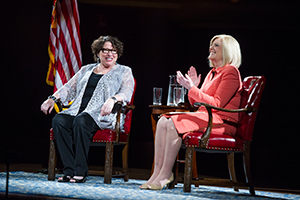A two-hour public conversation Wednesday night (Sept. 2) with U.S. Supreme Court Justice Sonia Sotomayor drew a crowd that filled the 840-seat Leighton Concert Hall and overflowed the adjacent Decio Theatre of the University of Notre Dame’s DeBartolo Performing Arts Center.
 Justice Sotomayor, left, talks about her career with NBC News correspondent Anne Thompson
Justice Sotomayor, left, talks about her career with NBC News correspondent Anne Thompson
With Notre Dame alumnae and trustees Anne Thompson, chief environmental affairs correspondent for NBC News, and U.S. Court of Appeals Judge Ann Claire Williams as her interlocutors — and with remarkable candor and warmth — the first Latina Supreme Court Justice discussed a wide range of legal, intellectual, cultural and even personal issues arising from her life and career. She also roamed the aisles of Leighton Hall, mingling affectionately and posing for photographs with audience members, and taking questions from 10 Notre Dame students.
Describing the day of her nomination six years ago, Sotomayor admitted to a surreal sense of astonishment. “I’m taking all this in, and yet I’m not quite there. I felt myself a little bit distant because it was all so overwhelming.” While she expected this dreamlike sense would dissipate rapidly, she said that it lasted for nearly a year and a half as “I watched myself doing things that I never imagined would be possible.”
Such things ranged from amusing — like being a dinner guest in the home of Jennifer Lopez, or throwing out a first pitch in Yankee Stadium — to “incredibly gratifying,” as she called her participation in the historic Citizens United vs. FEC decision dealing with the regulation of campaign spending by organizations.
Asked if the Supreme Court is as antagonistically divided as national politics often seem to be, Sotomayor spoke of the justices’ congenial personal interactions and collegiality, while acknowledging the occasionally heated writing of recent opinions. The justices are not “shy about expressing themselves,” she said, but insisted that “each one of us cares deeply about the Court’s institutional responsibility to the society. We work very hard when we can in good faith to reach consensus and the fact that we do as often as we do, I think shows that effort.”
Sotomayor described a conversation with colleagues about earlier Supreme Courts that were more bitterly and personally divided, remembering Justice Ruth Bader Ginsburg’s comment about what had so beneficially changed the atmosphere. “It’s when you started having women,” Ginsburg said.
For her own part, Sotomayor said that while diversity of gender and color on the Court were important improvements, attention to professional and religious diversity was needed as well. “We have a bunch of lawyers on the court, none of whom have done any serious criminal defense work, all of them prosecutors, only one civil rights lawyer, and only one justice who has practiced law alone.” Observing that there were six Catholics and three Jews on the Court, she said, “That’s not the majority of America.”
Asked about her judicial philosophy, Sotomayor said, “I have always tried to approach the law as a learning process, as one of trying to understanding how other people have approached particular questions. I believe that people really expect the law to have some fixed meaning that gives them some measure of comfort in their human relations.”
Concluding what she called “a truly extraordinary evening,” Williams told the Notre Dame audience that “you will never see a Justice do that again.” Williams then went on to do something at least as extraordinary, praising Sotomayor’s career by singing a slightly rewritten version of “To Dream the Impossible Dream.”
The applause was thunderous.